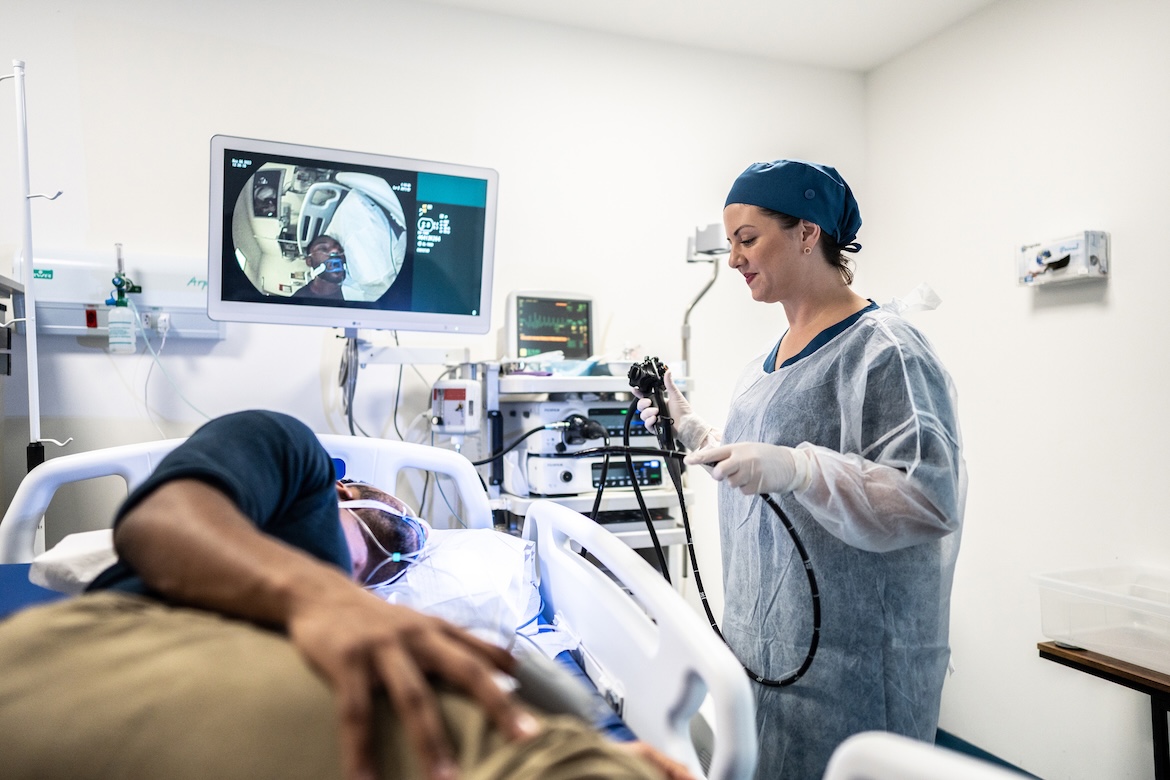Digestive discomfort can show up in many ways—bloating, pain, heartburn or unexpected changes in your bathroom habits. To get to the root of these symptoms, gastroenterologists use a range of diagnostic tests to uncover what’s going on inside your digestive system and guide the right treatment.
Here are seven diagnostic tests many GI doctors rely on, what to expect when undergoing these procedures and how they help maintain digestive health.
1. Endoscopy
“An endoscopy allows your gastroenterologist to look directly at the lining of your esophagus, stomach and the first part of your small intestine by guiding a thin, flexible tube fitted with a tiny camera down your throat,” said Riyadh S. Hammod, M.D., a gastroenterologist at Inspira Medical Group Gastroenterology Vineland. “Performed under mild sedation, this procedure helps doctors spot inflammation, ulcers or abnormal growths.” It can also take small tissue samples to help diagnose conditions such as acid reflux, peptic ulcers and early signs of cancer before they become more serious.
2. Colonoscopy
A colonoscopy involves threading a flexible scope through the rectum into the large intestine, enabling your doctor to inspect the entire colon for polyps, tumors or inflamed areas. After clearing your bowels with a special prep, you’re sedated for the test, which not only identifies precancerous growths but also allows for their immediate removal, making it a cornerstone of colorectal cancer prevention and the evaluation of disorders like ulcerative colitis or Crohn’s disease.
3. Upper GI series (barium swallow)
“During an upper GI series, you drink a chalky barium solution that coats the inside of your esophagus, stomach and duodenum, and a series of X‑rays reveal the shape and movement of these organs,” said Dr. Hammod. “This noninvasive imaging test can uncover structural issues like strictures, hiatal hernias or ulcers that can’t be felt or seen any other way.” It can also explain symptoms like persistent heartburn or swallowing difficulties.
4. Endoscopic ultrasound (EUS)
Endoscopic ultrasound (EUS) marries the visual power of endoscopy with high‑frequency sound waves to produce detailed images of your digestive tract walls and nearby structures, including the pancreas and bile ducts. Carried out under sedation, it often includes fine‑needle aspiration to sample suspicious areas. This combination of imaging and biopsy capability makes EUS invaluable for accurately staging cancers, evaluating cysts and guiding targeted treatment plans.
5. Capsule endoscopy
Capsule endoscopy offers a less invasive alternative for examining the small intestine, which is hard to reach with conventional scopes. “By swallowing a vitamin‑sized capsule containing a tiny camera, the device can capture thousands of images as it naturally travels through your digestive system,” said Dr. Hammod. “These images are transmitted to a recorder you wear on your belt, helping detect sources of bleeding, inflammation or lesions that other tests might miss.”
6. Stool tests
Simple yet powerful, stool tests analyze your bowel movements for hidden blood, infection-causing pathogens and markers of inflammation or malabsorption. After collecting a sample at home according to your doctor’s instructions, laboratory analysis can quickly point to causes ranging from bacterial or parasitic infections to conditions like celiac and inflammatory bowel disease, guiding timely and appropriate treatment.
7. Breath tests
Breath tests measure the gases released after you consume a sugar solution—often lactose or a substrate for bacterial overgrowth—and breathe into a collection device at regular intervals. “By identifying elevated hydrogen or methane levels, these noninvasive tests help diagnose lactose intolerance, small intestinal bacterial overgrowth and other digestive disorders,” said Dr. Hammod. This information allows you and your doctor to tailor dietary changes or treatments that ease your symptoms.
Understanding these diagnostic tests can help demystify the process and reduce any anxiety you might have when visiting your gastroenterologist. Early detection and accurate diagnosis are fundamental to effective treatment, ensuring you can address digestive issues promptly and maintain a healthier lifestyle.
Learn more about gastroenterology and digestive health at Inspira.
